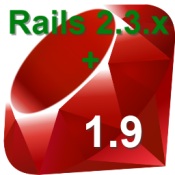16 December 2010 | Programming |
 If you’re like me, you’ve got a Rails 2.3.x application running on Ruby 1.8.x – or perhaps Ruby Enterprise Edition. Well, that’s all fine and dandy, but Ruby 1.9.2 is about twice as fast as even REE 1.8.7. So, you’ll probably want to upgrade to the new version of Ruby.
If you’re like me, you’ve got a Rails 2.3.x application running on Ruby 1.8.x – or perhaps Ruby Enterprise Edition. Well, that’s all fine and dandy, but Ruby 1.9.2 is about twice as fast as even REE 1.8.7. So, you’ll probably want to upgrade to the new version of Ruby.
Problem is, you upgrade Ruby and then your Rails 2.3 app starts whining about character encoding problems. Heck, it might not even run! So you search the net in vain trying to find a simple, step-by-step explanation of what you need to do to make your app run with the speedy 1.9.x version of Ruby. And, you pretty much come up empty handed.
Until now!
Here I shall endeavor to outline all the steps necessary to install and convert your Rails 2.3.x app to work flawlessly with Ruby 1.9.x.
(more…)
7 August 2010 | Programming |
 Every web programmer knows that UTF-8 is where it’s at these days. Even if you are coding something for only the US market, you’re still probably going to run into names, addresses, or whatever with accented characters.
Every web programmer knows that UTF-8 is where it’s at these days. Even if you are coding something for only the US market, you’re still probably going to run into names, addresses, or whatever with accented characters.
Everyone knows that “all you have to do” is make your app speak UTF-8, set the character encoding in your web pages to UTF-8, and set your database encoding and collation to something like utf8_unicode_ci, and you’re off and running… right?
Not quite. You’ve probably run into the situation where you hop into phpMyAdmin and edit some table row, and what to your wondering eyes should appear, but something like this:
Voici un article français.
Well, crap. That’s supposed to be a “ç” in “français”, not an “ç”!
And yet, when you view the web page and edit the content in your app, it looks and works fine! What’s going on here?
It’s really quite simple, and apparently something that no one bothers to mention: you have to tell your app to communicate with the database in UTF-8! Here’s how you do that in PHP and Rails…
(more…)
 If you’re like me, you’ve got a Rails 2.3.x application running on Ruby 1.8.x – or perhaps Ruby Enterprise Edition. Well, that’s all fine and dandy, but Ruby 1.9.2 is about twice as fast as even REE 1.8.7. So, you’ll probably want to upgrade to the new version of Ruby.
If you’re like me, you’ve got a Rails 2.3.x application running on Ruby 1.8.x – or perhaps Ruby Enterprise Edition. Well, that’s all fine and dandy, but Ruby 1.9.2 is about twice as fast as even REE 1.8.7. So, you’ll probably want to upgrade to the new version of Ruby.


Recent Comments